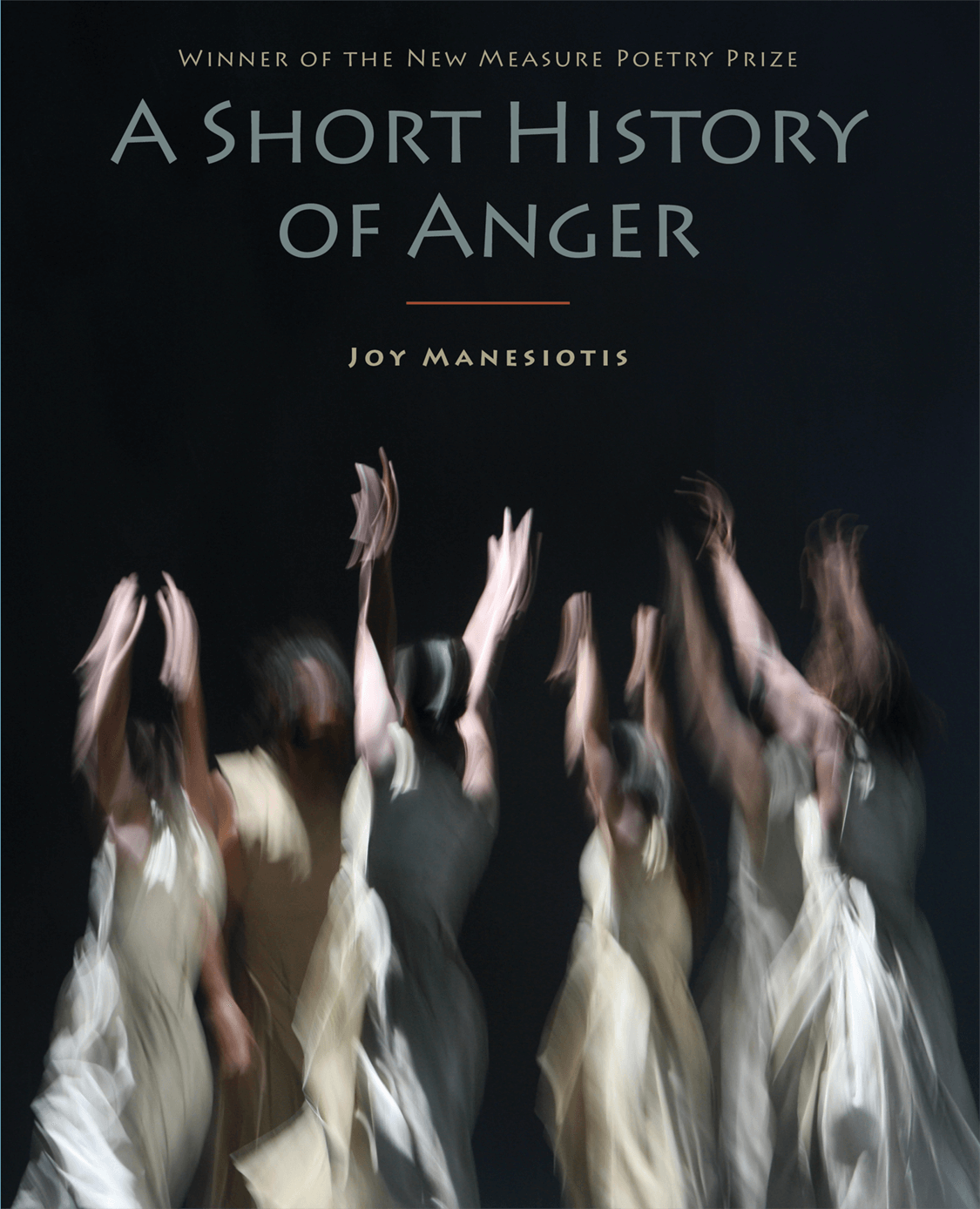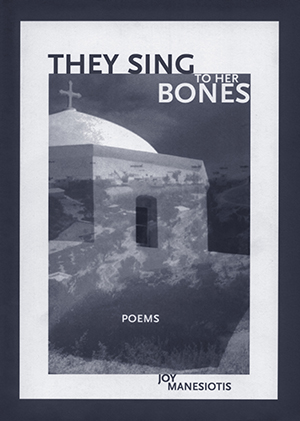Joy Manesiotis
poet editor teacher
Joy Manesiotis | poet editor teacher
Joy Manesiotis | poet editor teacher

Winner of the
New Measure Poetry Prize,
chosen by Brenda Hillman.
Free Verse Editions | Parlor Press
A Short History of Anger
A Short History of Anger is a lament spoken through fragments, fractures, song, and the voices of a modern-day Greek Chorus. This multilayered book and performance takes as its source material the massacre of Greek citizens in the 1922 Destruction of Smyrna, and the buried traces of this tragedy as they haunt the poet’s family history. Musical, ritualistic, and elegiac, A Short History of Anger confronts, with both love and anger, a legacy of genocide and displacement as it resonates through successive generations.
“Joy Manesiotis is a brilliant poet, one who understands, that lyric, as Joseph Brodsky once insisted, is a soul’s release into language. So, watch how the line-breaks, sentences, precise orchestrations and wonders of syntax work in her poems, how they move us to a different register of human emotions, how they open doors we did not know exist. Manesiotis is wonder poet, one whose work I admire deeply.”
—Ilya Kaminsky, author of
Dancing In Odessa and Deaf Republic
“When a great catastrophe, the genocide of the Greeks of Smyrna, is immured in silence, does collective horror harbor in the genes—the blood line a long fuse smoldering with hidden fire, ‘Smyrna burning and burning….’ How to speak of such things? But ‘who will sing the moirolaia to help the souls cross over?’ In answer, voices—ancestral, choral, personal—rise from the ashes in this eloquent moirolaia of Joy Manesiotis: recovered history, lamentation, remembrance, release.”
—Eleanor Wilner, author of
Before Our Eyes: New and Selected Poems, 1975–2017
“When, in Anna Akhmatova’s famous poem, she was asked ‘Can you describe this?’ about an atrocity she lived through, she replied, ‘Yes, I can.’ In A Short History of Anger, Joy Manesiotis lifts the same burden of responsibility to her own shoulders, and the beautiful, heartbreaking poem she made here could have been written a thousand years ago, or yesterday. And the terrible thing is, when I look up from this book, our landscape is the same as inside it: on fire. When no remedy is coming, poets at least make it possible to sit in the dirt and weep. Sit here with me. I would count it a privilege to hold your hand and keen these poems together.”
—Patrick Donnelly, author of
Little-Known Operas, Nocturnes of the Brothel of Ruin, and The Charge
Revoke
Layered in overlapping movements, Revoke draws on the poet’s early training in visual art and film, as well as the form of the lament in Greek culture, both ancient and contemporary. Poem by poem, the collection becomes symphonic, rising and falling through cycles of multivocality, sound, repetition, and silence. Levels of loss—of mothers and mothering, of the complexities of female agency—are sounded and measured in fragmented, cinematic shifts between image and event as if to investigate how discursive gestures and the lyric, when fractured, can turn in tension to refute linearity, yet still create vivid moments of human time and experience. Revoke shows us how the epic can be embodied in lyric form, holding all and telling all, with the precision, beauty, and complexity that grief, and all human experience, deserves.
“With gorgeous results, Revoke recreates ancient rituals for our contemporary grief by excavating twin losses: a mother’s death and a woman’s reckoning with her own infertility. The prologue introduces how both losses begin, of that moment when biological randomness creates fate, what if, in the shadow life of the body, a million processes / firing in all directions—unseen, internal—one direction / goes off track. And so we enter a world where present-day, medicalized griefs are the stuff of high lyric form, with much beauty and humility. Here the natural world is an opportunity for divination, a hole, / a crow-shaped tear // in the fabric of air. Here, traditional dances, both the solo Greek zeibekiko and the tango, the famous dance of couples, act as ritual, too: the dance, its rotation of grief, its dark energy. In a moving conclusion, Manesiotis describes the Greek funeral ritual where the bones of the deceased are exhumed and washed in wine after five years. Strikingly, the pomes in Revoke perform the rituals Manesiotis, and all of us, still need.”
—Connie Voisine, author of
The Bower and Calle Florista
“Revoke is the rare lyric marvel by a poet who understands the serious task of writing at the threshold: of what is known and unknowable, what is said and unsayable, that shadow scrim between life and death. Joy Manesiotis not only dwells at these fine edges, she discovers there, and she makes from it a delicate and precise singing all her own. Marry{ing} spirit to matter, her poems simultaneously reach toward a dying mother and the body’s struggle to become a mother, and act as both witness and interior pulse, the body revolving on itself. Against the ocean’s constant background, the internal force of lament turns and turns, physically through the dancing of her Greek culture and tango practice with her partner, and through the exquisite mind of this book that is capable and generous enough to gather the infinities of endless movements. This is a work of great attention, vigor, and accomplishment.”
—Jennifer Sweeney, author of
Little Spells and Foxlogic, Fireweed
They Sing to Her Bones
“Manesiotis is only one generation removed from that most basic American fact that almost everyone in this country came from elsewhere; that we who follow are all mutts, genetically or culturally or both. She’s in that familiar nevertheless curious position—grandchild of immigrants and exiles, in this case from Greece—and she uses it without sentimentality to get at the sweet and the dark of such an equation: what is left behind never quite translates…As much as song guides these poems – and often Manesiotis’ early training as a musician is obvious, especially in wonderfully fractured pieces where a more lyric sound is keyed, as in ‘Fugue,’ ‘O Beautiful Boy,’ or in ‘Fledgling’—a certain ‘not singing’ is an equal force here, one that finds in stillness and its children (painting, photographs, scenes meticulously sketched from the past) a kind of eternal, seemingly wordless presence.”
—Marianne Boruch,
from the Foreword
“The lyric impulse is alive and well in They Sing to Her Bones, a magnificent first book that marries lament with the music of surviving. In these elegant poems, Manesiotis reminds us that memory is not a static map of the past, but a place itself, like the author’s beloved Greece, from which we launch the infinite possibility of our lives each day. Let us welcome these beguiling songs of what was and what still might be.”
—Dorothy Barresi
“‘Inconsolable, loose grief, wild/ and keening’ is Joy Manesiotis’ formidable subject, anchored in family stories, rigorous observation, and vivid writing that captures its manifold features and nails it down.”
—Michael Ryan

